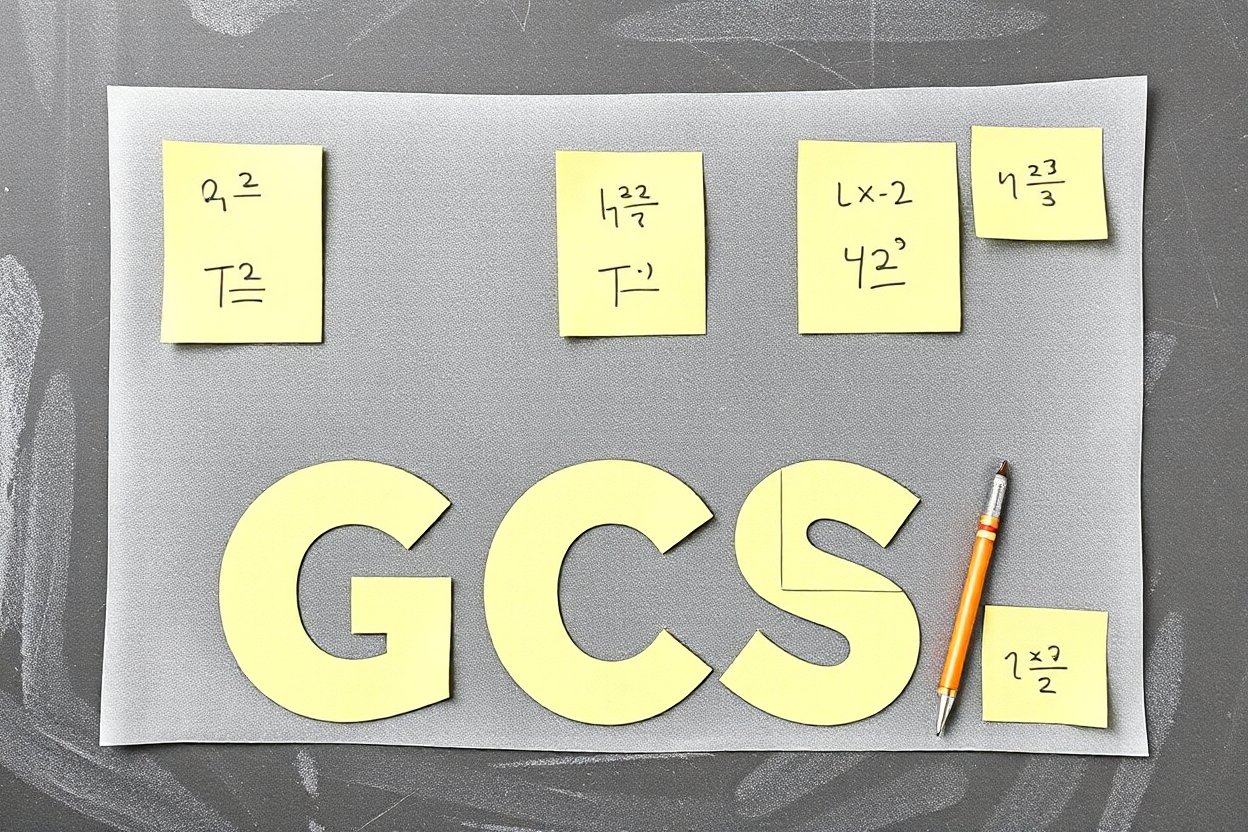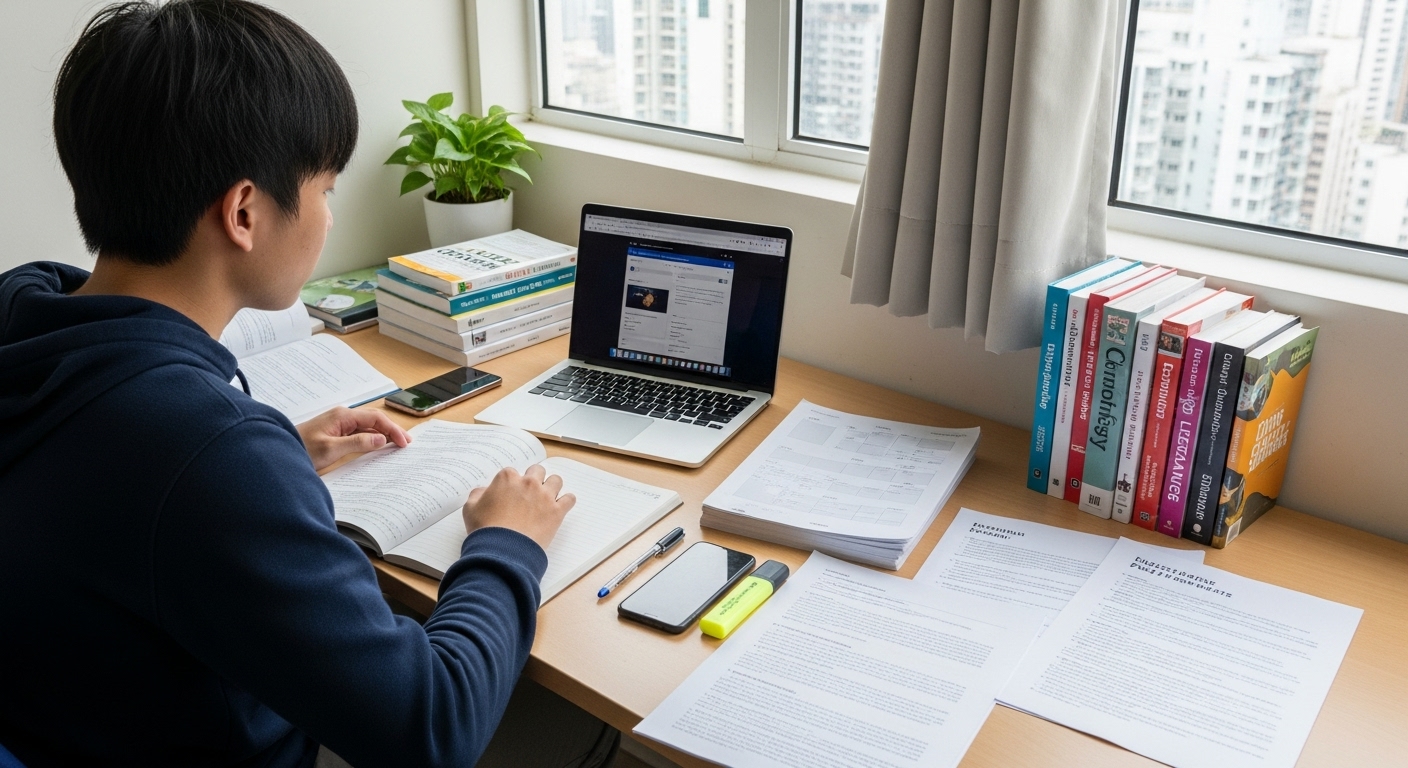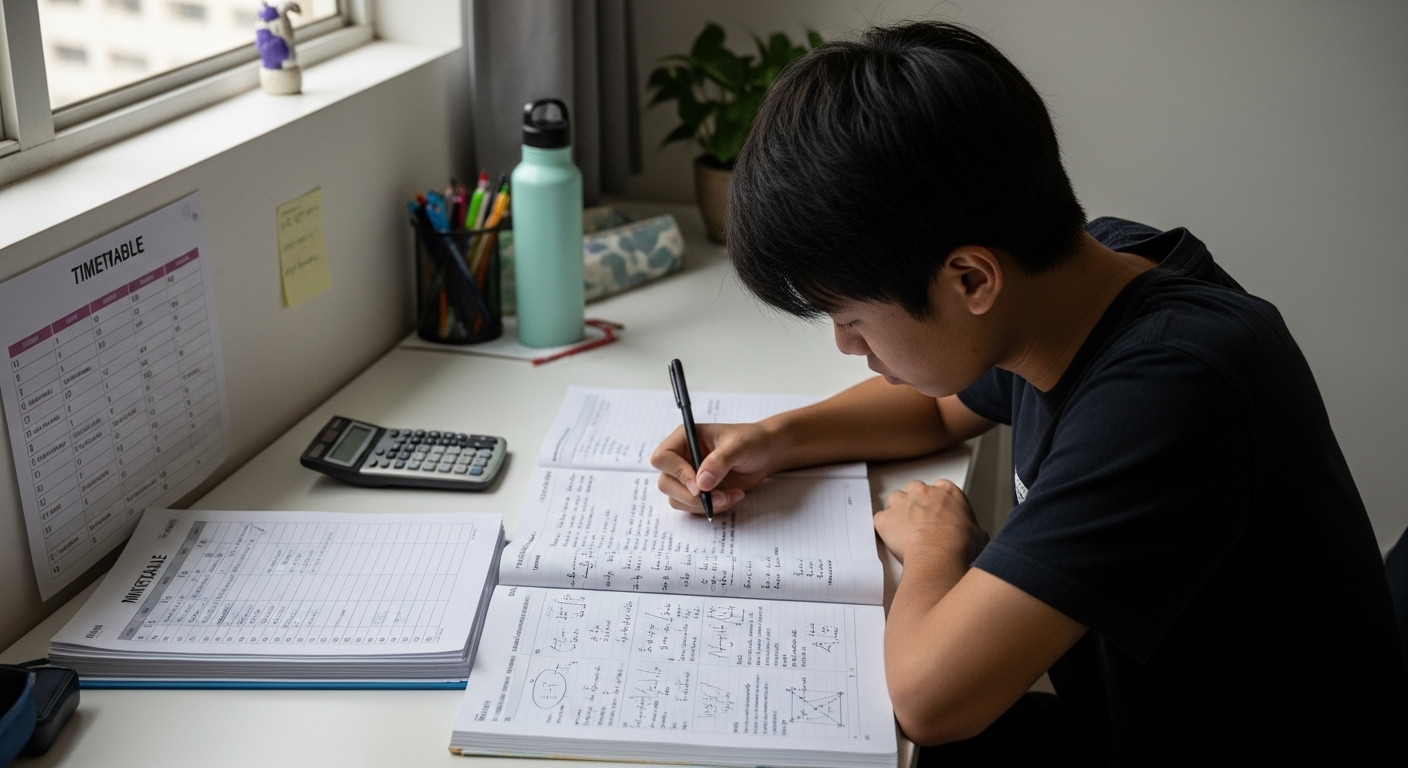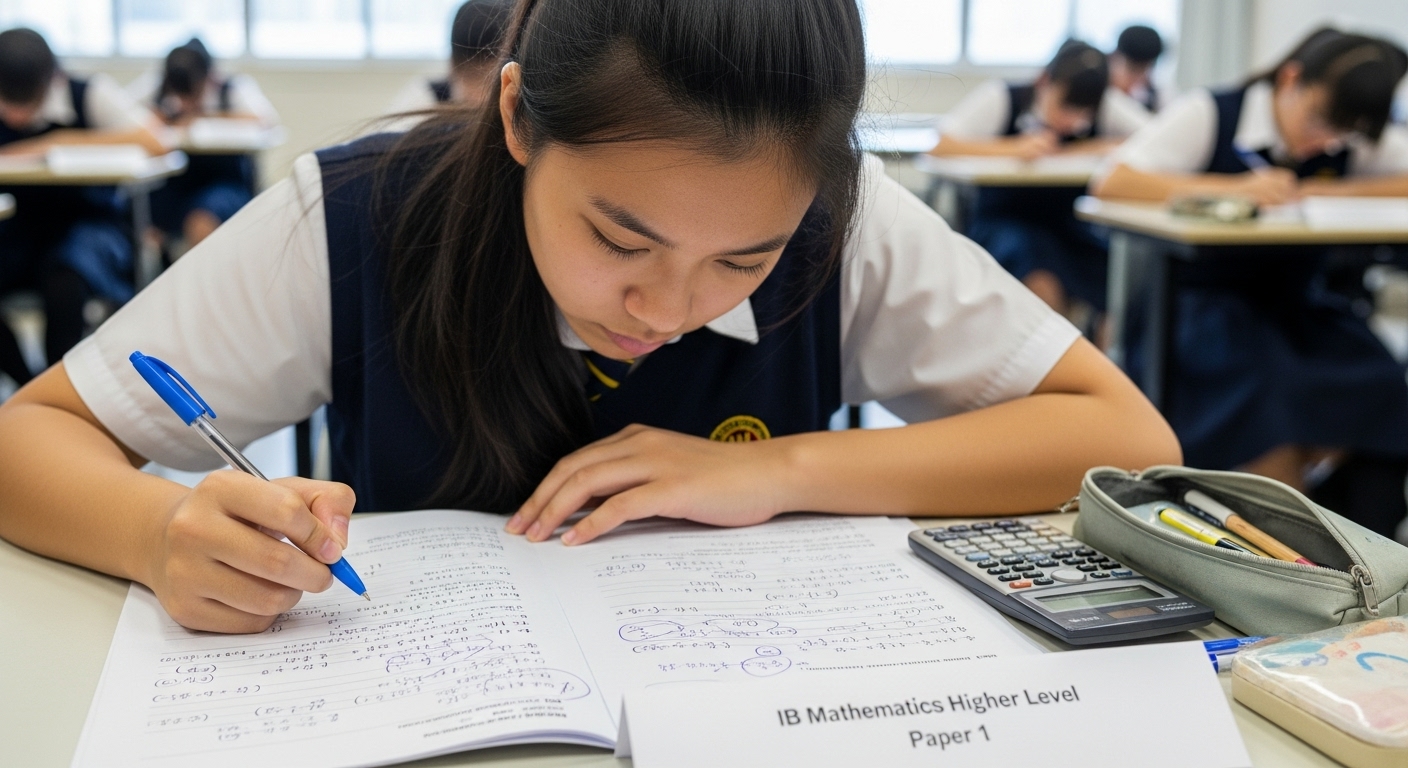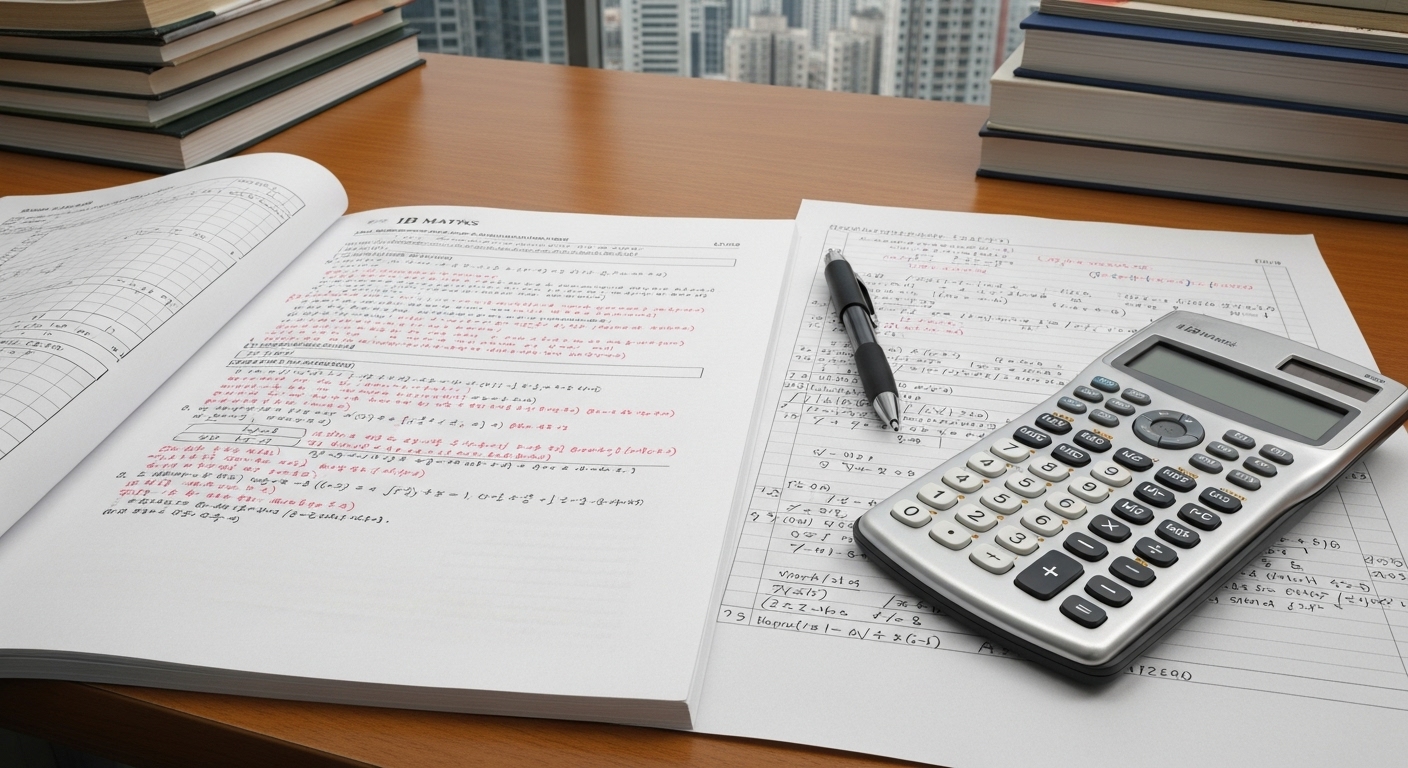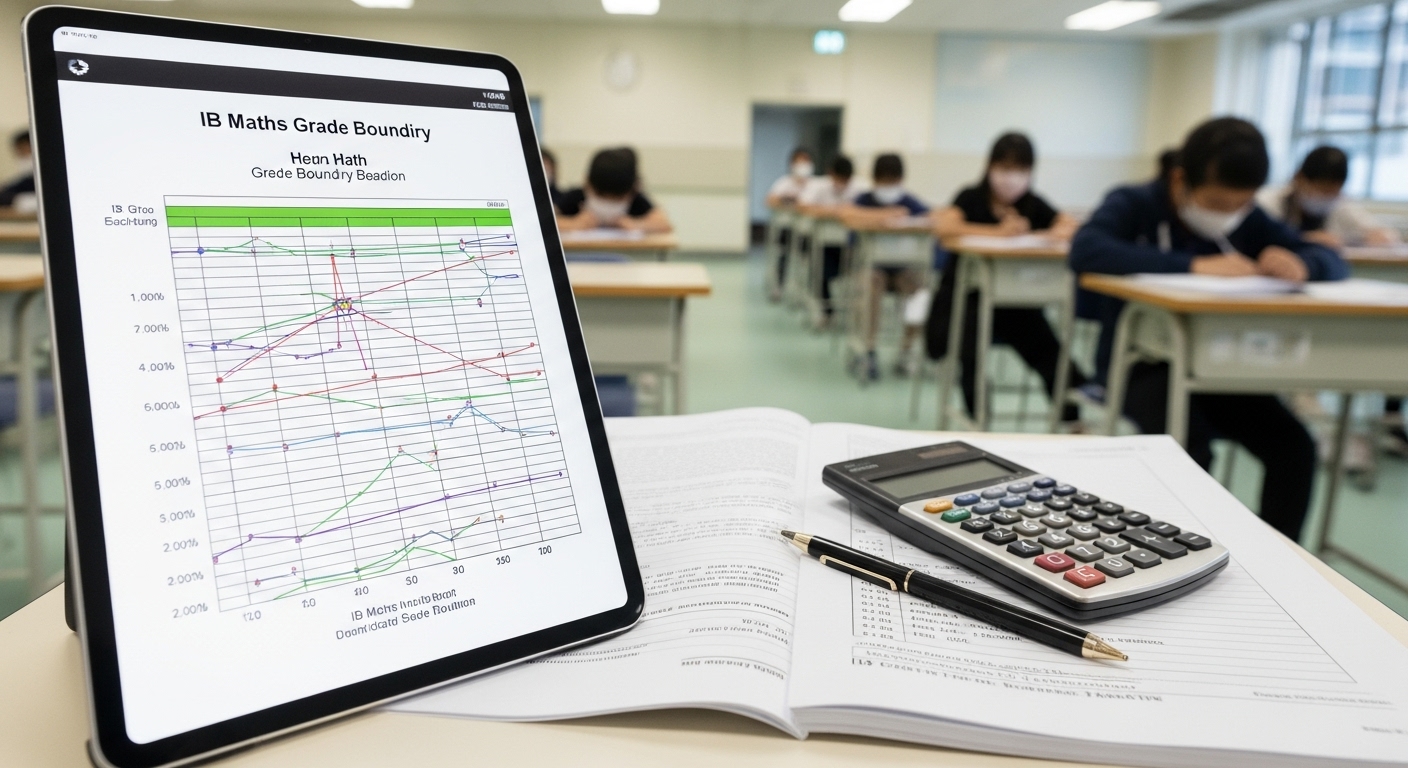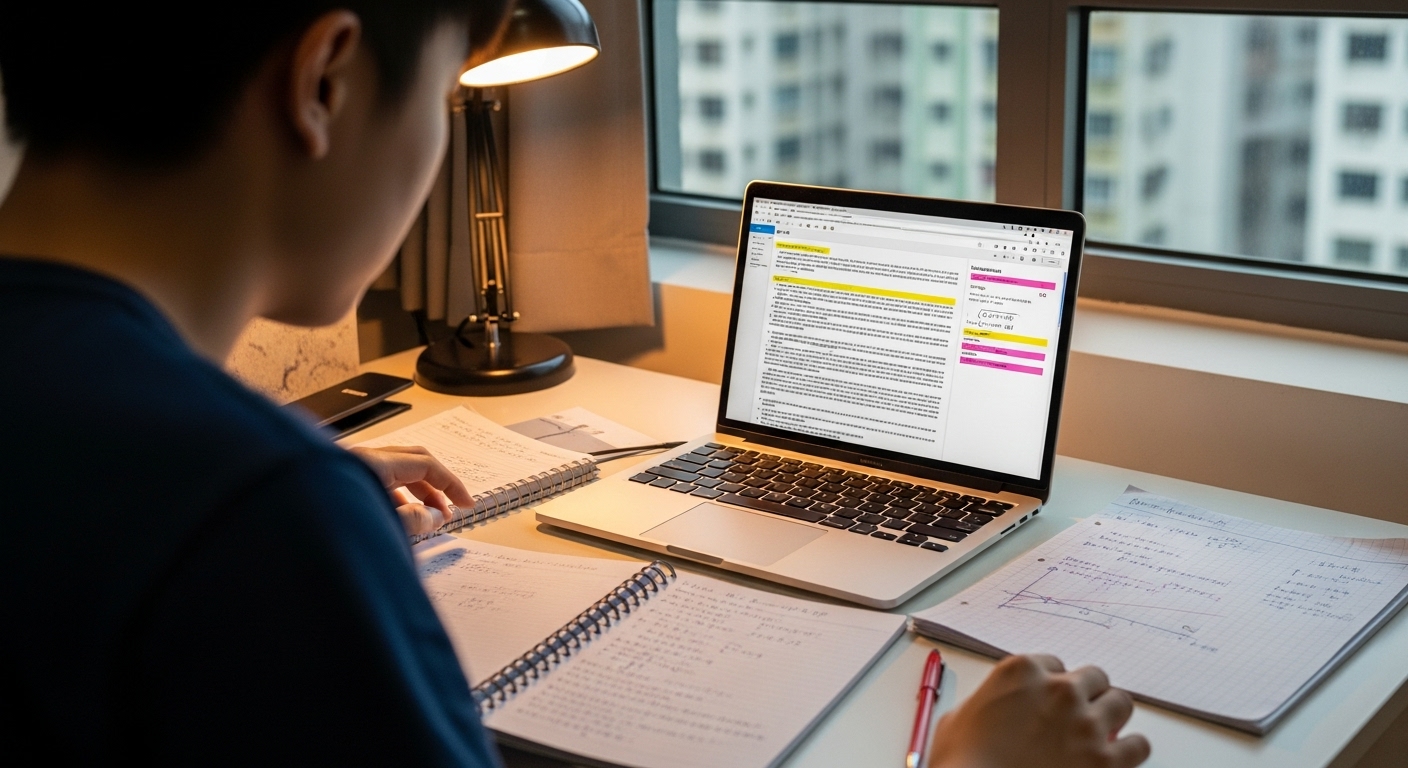How to Revise Maths for GCSE: Effective Techniques
To excel in Maths, you need plenty of practice. Start by doing some reading or watching videos to understand the basics, but focus most of your time on actively working through problems. As you revise GCSE Maths, remember it covers a wide range of topics, from algebra and geometry to probability and statistics. While you might remember some parts, others may need a refresher—and the exam is designed to test your overall understanding, not just the parts you’re already good at.
So, why is revising so crucial? Here’s why:
- Build Confidence: Regular revision helps reinforce the concepts you’ve learned, giving you the confidence to tackle questions under exam conditions.
- Identify Weaknesses: When you start revising, you’ll quickly notice which areas you need to improve. This helps you focus on the topics that require more practice.
- Master Exam Techniques: Beyond the content itself, revision helps you get familiar with the exam format and timing, so you’re not surprised on the day.
Revision isn’t just about remembering formulas; it’s about understanding how to apply them. By revising, you can see patterns in the types of questions that come up and practice the problem-solving techniques you’ll need. Whether you’re aiming for a pass or targeting top grades, a solid revision plan gives you the best chance of success.
Understanding the Basics: How to Start Revising GCSE Maths GCSE
If you’re ready to begin your revision journey, let’s break down the essential steps for getting started in a way that’s manageable and, honestly, a lot less stressful.
2.1 Create a GCSE Maths Revision Schedule
A revision schedule is your first essential tool for success. Think of it as a map—it guides your daily efforts so that you’re covering everything without feeling overwhelmed. Start by:
- Setting Weekly Goals: Map out the topics you want to cover each week. Aim to cover a mix of topics, like algebra one day and geometry the next. This keeps things fresh and avoids burnout.
- Allocating Time Blocks: Decide on daily or weekly time blocks you can realistically commit to. Even 30 minutes a day adds up over time. Consistency is key, so make sure to stick to your plan.
- Tracking Progress: As you move through each topic, check off what you’ve completed. Not only does this feel rewarding, but it also keeps you motivated to stay on track.
Making a schedule might sound simple, but it’s one of the most effective ways to ensure you’re ready when exam time comes. It also prevents last-minute cramming, which usually isn’t very effective for maths.

2.2 Set Realistic Goals for Each Session
Setting goals is essential to keep your revision sessions focused. Instead of telling yourself you’ll revise “maths” for an hour, break it down into smaller, specific goals. For example:
- Review Key Formulas: Spend 10 minutes refreshing important formulas for the topic at hand.
- Solve Five Practice Questions: Apply what you’ve reviewed by solving a few targeted questions.
- Recap: At the end of your session, quickly go over what you learned and identify anything you need to work on further.
Setting realistic goals makes each session feel manageable and productive. It’s also a great way to keep track of your progress, which helps with motivation.
2.3 Start with the Basics
Before diving into more complex topics, start by refreshing the basics. This could mean reviewing core GCSE Maths concepts like arithmetic, basic algebra, and geometry. Even if you feel confident, a quick review ensures you have a strong foundation, which makes tackling tougher topics much easier. If you skip over the basics, it’s easy to get stuck later on.
2.4 Gather Essential Revision Resources
There’s no shortage of resources to help with GCSE Maths, but it’s essential to pick the ones that match your learning style. Some key resources include:
- Textbooks and Revision Guides: Go for guides that cover the full GCSE Maths syllabus. Many of these include practice questions at the end of each topic, which are perfect for testing your understanding.
- Online Resources and Apps: Websites, apps, and video tutorials can break down complex topics and offer interactive ways to study. They’re great for visual learners and offer different explanations, which can be useful if you’re struggling with a particular concept.
- Past Papers: Practicing with past papers helps you get used to the format of the exam and the types of questions you’ll encounter. It’s one of the most effective ways to test your knowledge and prepare for exam conditions.
By starting with these essential tools and tips, you’re already setting yourself up for a successful GCSE Maths revision journey.
The Best Ways to Revise Maths GCSE
3.1 Practice Past Papers
One of the most effective ways to revise for GCSE Maths is to get familiar with past papers. Working through past exams is like giving yourself a test run; you’ll get used to the style of questions, the format of the paper, and the time constraints. Start with a paper, set a timer, and complete it under real exam conditions. Afterward, go over your answers and review any mistakes you made. This technique helps you identify areas for improvement and understand what the examiners are looking for.
3.2 Break Down Topics into Small, Manageable Chunks
Trying to tackle the entire GCSE Maths syllabus at once can feel overwhelming. Instead, break it down into small chunks. Focus on a single topic at a time, like algebra or geometry, and thoroughly understand that area before moving on. This approach, known as “chunking,” helps you make steady progress and ensures you don’t miss any key concepts.
- Create Topic Lists: Make a list of all the topics covered in your syllabus. Work through each topic one at a time.
- Use a Study Guide: A structured study guide can help you focus on one section at a time, ensuring you cover all essential areas without jumping around.
3.3 Use Different Learning Resources
Textbooks, apps, online tutorials, and video lectures all offer unique ways to learn, so don’t limit yourself to just one type of resource. Use resources that fit your learning style. For example:
- Visual Learners: Videos and diagrams can help you see the logic behind maths concepts.
- Hands-On Learners: Practice questions and interactive tools like apps or worksheets work well for hands-on learners.
Mixing resources can also make your study sessions more engaging, keeping things fresh and helping you avoid study fatigue.
3.4 Practice Regularly, Not Just Before the Exam
Consistency is key in maths. Instead of revising everything right before your exam, aim to practice regularly throughout the year. Short, frequent study sessions are more effective for retaining information than cramming. Spend 15-20 minutes each day on a different maths topic to build a solid foundation and keep concepts fresh.
Smart Techniques for Memorizing GCSE Maths Formulas and Concepts

Let’s face it—memorizing formulas is one of the trickiest parts of revising for GCSE Maths. The good news? You don’t have to just rely on rote memorization. There are smart ways to retain formulas and understand how to use them as you revise GCSE Maths. This is especially true for topics like vectors, where visual understanding and spatial reasoning can make a big difference. Here’s how to make sure you can remember and apply the most important formulas and concepts on exam day.
4.1 Understand, Don’t Just Memorize
A common mistake is to memorize formulas without really understanding them. But if you know why a formula works, it’s much easier to remember and apply it in different contexts. For example:
- Break Down the Formula: Take a formula like the Pythagorean theorem (a² + b² = c²) and understand what each part represents.
- Apply It in Context: Work through example problems to see how the formula is used, and practice with different scenarios.
Understanding the logic behind a formula makes it more memorable and gives you the flexibility to apply it even if the question is presented in a new way.
4.2 Use Mnemonics and Memory Tricks
Mnemonics are fantastic for memorizing tricky formulas or order of operations. For instance:
- PEMDAS for the order of operations: Parentheses, Exponents, Multiplication, Division, Addition, Subtraction.
- SohCahToa for trigonometry: Sin = Opposite/Hypotenuse, Cos = Adjacent/Hypotenuse, Tan = Opposite/Adjacent.
Simple memory aids like these are great for recalling formulas quickly during an exam, and they add a bit of fun to your revision routine.
4.3 Create Flashcards for Key Formulas
Flashcards are a tried-and-true revision method for a reason. Write each formula on a flashcard with an example of how it’s used. Go through your flashcards regularly, mixing them up to challenge your memory. This active recall practice helps reinforce the formulas in your mind and is ideal for quick revision sessions on the go.
4.4 Teach the Formula to Someone Else
Teaching a concept is one of the best ways to solidify your understanding. When you explain a formula to a friend or family member, it forces you to think about it in detail. Teaching someone else also highlights any gaps in your knowledge, giving you a chance to revise those areas further.
4.5 Practice with Formula Sheets and Cheat Sheets
Create a formula sheet or “cheat sheet” with all the essential GCSE Maths formulas. This acts as a quick-reference guide that you can use during revision sessions. Practice using this sheet in timed practice tests, so you get used to looking up and applying formulas under exam conditions. Over time, you’ll find that you rely on the sheet less and less, as you’ll have committed the formulas to memory.
Building a Strong Revision Routine for GCSE Maths
Many people think that “revising” just means re-reading notes and doing a couple of exercises now and then. But if you’re serious about boosting your GCSE Maths score, building a strong revision routine is key. An organized routine can help you cover more ground, retain information better, and feel more confident when exam time rolls around. Here’s how to get your routine on track.
5.1 Set a Consistent Schedule to revise GCSE Maths
Consistency is one of the most powerful ways to reinforce your learning. Set aside a specific time each day for maths revision, whether it’s 30 minutes after school or a longer session on the weekend. A set schedule will train your brain to get into “study mode,” making it easier to focus and get things done.
- Create a Weekly Plan: Break down your topics across the week. For example, Monday could be dedicated to algebra, Tuesday for geometry, and so on.
- Stick to Your Timetable: Having a set timetable not only keeps you on track but also ensures you cover all areas without rushing.
5.2 Start with the Hard Stuff First
When you’re building your routine, tackle the harder topics first. It’s tempting to start with what feels easy, but facing the challenging areas when your mind is fresh helps you make better progress. You’ll feel more accomplished as you work through tougher concepts, and this boost of confidence will keep you motivated.
5.3 Set Realistic Goals
Break down your study goals into small, achievable steps. Instead of saying, “I’ll study trigonometry today,” set a more specific goal like, “I’ll master the basic trigonometric formulas and solve 5 practice problems.” By setting realistic goals, you’re less likely to feel overwhelmed, and you’ll see steady progress over time.
- Track Your Progress: Keep a log of the topics you’ve covered. This can be a simple checklist, which will make you feel accomplished as you tick off each area.
- Reward Yourself: After reaching a goal, give yourself a small reward – maybe a short break or a snack. Positive reinforcement makes the whole process more enjoyable!
5.4 Mix Up Your Revision Techniques
Using a variety of revision techniques keeps your routine interesting and prevents study fatigue. For example:
- Do Some Flashcard Review: Start with a quick 10-minute flashcard session on key formulas.
- Work on Past Papers: Finish with some past paper practice to apply what you’ve just revised.
This approach helps reinforce your learning and keeps you engaged throughout each session.
5.5 Take Regular Breaks
One big mistake in revision routines is skipping breaks. Research shows that regular breaks improve focus and memory, so don’t forget to rest between study sessions. Try the Pomodoro Technique—study for 25 minutes, then take a 5-minute break. After completing four “Pomodoros,” take a longer 15- to 30-minute break. This method helps maintain focus and keeps your mind fresh.
Building a Strong Revision Routine for GCSE Maths
One common mistake in revision routines is skipping breaks. Research shows that regular breaks improve focus and memory, so don’t forget to rest between study sessions. Try the Pomodoro Technique—study for 25 minutes, then take a 5-minute break. After completing four “Pomodoros,” take a longer 15- to 30-minute break. This method helps maintain focus, keeps your mind fresh, and is an essential part of a smart approach to revise GCSE Maths and achieve success.
6.1 Prioritize Your Weak Areas
With limited time, it’s essential to focus on your weakest areas. Go through a list of all the topics and mark the ones that still feel challenging. Use these last few days to focus specifically on these areas. By targeting your weak spots, you can quickly boost your confidence and shore up any remaining gaps.
- Use Quick Guides or Summaries: Review any summaries or cheat sheets you’ve made. This way, you get a condensed version of each topic without diving into every detail.
6.2 Review Key Formulas and Theorems

Maths exams often rely on a core set of formulas and theorems. Spend time revising these key points to make sure you can recall them instantly during the exam. Use your flashcards or even create a “formula list” and keep revisiting it until it sticks.
- Test Yourself: Try covering up your list and reciting each formula from memory. If you miss one, go back to it and repeat until it’s solid.
6.3 Do a Quick Past Paper Run-Through
Doing a full past paper might be too time-consuming when you’re just a day or two from the exam. Instead, scan through a past paper and pick a handful of questions from different sections. Aim to answer these quickly, as this gives you a quick refresher on various topics and keeps your problem-solving skills sharp.
6.4 Practice with Time Constraints
For last-minute revision, practice under time constraints to simulate real exam conditions. Set a timer, and give yourself a strict time limit for each question. This exercise is great for building speed and reducing the chance of running out of time during the actual test.
6.5 Get Plenty of Rest and Relax
One of the best things you can do in the last 24 hours is to relax and get a good night’s sleep. Staying up all night to cram will likely leave you too tired to think clearly in the exam. Instead, use the last evening for a light review session, maybe going over your formula sheet one final time, then wind down. A relaxed mind performs much better, so make rest a priority.
A solid revision routine is key to GCSE Maths success, but remember: it’s not about studying harder but smarter. By tackling hard topics first, using various learning resources, and setting achievable goals, you’ll build a routine that works for you. And for those last-minute days? Target your weak areas, review key formulas, and don’t forget to get some rest. This balanced approach will make sure you’re well-prepared and ready to succeed.
Avoiding Common GCSE Maths Mistakes
There’s a common belief that making mistakes in maths means you’re just ‘bad at maths.’ But that’s not true! Mistakes are often the result of small slips in understanding or rushing through problems. By spotting and addressing these common mistakes as you revise GCSE Maths, you can strengthen your maths skills and feel more confident in your answers.
7.1 Misreading the Question
One of the most common GCSE Maths mistakes is simply not fully understanding what the question is asking. Sometimes, students skim the question, missing out on critical details like units or specific instructions.
- Take Your Time: Make it a habit to read every question twice. Look for keywords that tell you what’s being asked, like “simplify,” “solve,” or “evaluate.”
- Underline Key Info: Underline numbers, units, and important terms in each question to make sure you don’t miss anything crucial.
7.2 Making Assumptions
Another common error is assuming a problem is like one you’ve done before, which can lead to skipping essential steps. Each question is unique, so stay alert to any differences.
- Follow Each Step Carefully: Even if a problem seems familiar, go through each step to ensure accuracy. Don’t assume that every question follows the exact same pattern.
- Avoid Over-Simplifying: Sometimes, students try to simplify too much and lose important information in the process. Stick with the process, and check your work as you go.
7.3 Forgetting Units
In maths, especially on exams, forgetting to include the correct units is a frequent mistake. Whether it’s cm, kg, or m/s, units are essential for a complete answer.
- Double-Check Units: Before you move on, check if your answer includes the correct units. A well-answered question with missing units can lose you easy marks.
- Make it a Habit: Practice adding units every time you write an answer during your revision so that it becomes second nature.
7.4 Rushing Through Calculations
Under exam pressure, it’s easy to rush through calculations, leading to silly mistakes. Taking a few extra seconds to verify calculations can make a big difference.
- Re-calculate If Possible: Double-check tricky calculations, even if it means redoing them. You’re more likely to catch mistakes this way.
- Write Neatly: Messy handwriting or jumbled work can make it hard to spot calculation errors. Keep your work clear and organized to avoid confusion.
7.5 Skipping Steps or Workings
Another mistake is to skip writing down steps, especially if you think you know the answer. However, showing your workings not only helps the examiner follow your thought process but also provides a check for you as you solve the problem.
- Show All Steps: Even for simple problems, make it a habit to write down your steps. This reduces errors and helps you review your approach.
The Best Resources to revise GCSE Maths
When it comes to GCSE Maths revision, not all resources are created equal. Some students think they only need their textbook, but using a mix of high-quality resources will help deepen your understanding and keep revision engaging. Let’s go over some of the best resources to boost your revision.
8.1 Online Video Tutorials to revise GCSE maths
Video tutorials can be fantastic for visual learners. Platforms like YouTube and specialist sites offer videos that explain concepts step-by-step. These tutorials are especially helpful if you’re struggling with complex topics like trigonometry or algebra.
- Use YouTube Channels: Channels like “Maths with Mr. J” and “HegartyMaths” provide free, high-quality tutorials that cover the entire GCSE curriculum.
- Try Dedicated Platforms: Websites like Mathzem.com have structured video courses specifically designed for GCSE Maths. These platforms often provide extra support, like quizzes and interactive examples.
8.2 Past Papers and Mock Exams

Practicing with past papers is one of the best ways to prepare for GCSE Maths. They help you understand the question format, timing, and common question types.
- Download Past Papers: Sites like AQA and Edexcel provide free downloads of past papers and mark schemes. Try to complete these under timed conditions to build exam confidence.
- Review Answer Sheets: After finishing a paper, go through the mark scheme to check your answers. This will help you spot any recurring mistakes and understand where you need improvement.
8.3 Revision Guides and Workbooks
A good revision guide simplifies complex topics and provides practice questions. Look for GCSE Maths revision books that are exam-board specific to make sure they cover exactly what you need to know.
- Popular Guides: Books like the “CGP GCSE Maths Revision Guide” and “Collins Maths Workbook” are widely recommended for clear explanations and plenty of exercises.
- Work Through Examples: Most revision guides offer worked examples alongside practice problems, which are ideal for understanding how to approach each question type.
8.4 Flashcards for Formula Memorization

Flashcards are perfect for memorizing maths formulas, definitions, and quick problem-solving steps. They’re easy to carry around and great for quick revision sessions.
- Make Your Own: Writing your own flashcards is a valuable revision activity. Jot down a formula on one side and an example problem on the other.
- Use Digital Flashcards: Apps like Quizlet offer pre-made GCSE Maths flashcard sets that you can review on your phone.
8.5 Maths Apps and Online Practice Sites
If you’re looking for quick, interactive practice, maths apps and websites are excellent resources. Many apps allow you to practice specific topics and provide instant feedback.
- Popular Apps: Apps like “Photomath” and “Mathway” allow you to solve problems by taking a photo and walking you through the solution. However, for GCSE-specific practice, “MyMaths” and “BBC Bitesize” are great for topic-by-topic exercises.
- Interactive Practice Sites: Sites like Corbettmaths and Khan Academy provide thousands of free practice questions and detailed answers.
8.6 Group Study Sessions
Sometimes, the best way to revise GCSE maths is by teaching or discussing concepts with someone else. If you have friends who are also studying for GCSE Maths, setting up a group session can help you learn from each other.
- Create a Study Plan Together: Group study sessions work best with structure. Choose a topic in advance, and each person can prepare problems to discuss with the group.
- Teach Each Other: Explaining concepts out loud can reinforce your own understanding. Plus, your friends might bring insights or tricks you hadn’t considered.
Making the Most of Exam Day
There’s this widespread idea that on exam day, you have to cram in every last bit of information. However, trying to learn something new just hours before your Maths GCSE exam is rarely effective. Instead, focus on staying calm, being prepared, and applying the knowledge you’ve already worked so hard to master as you revise GCSE Maths.
9.1 Get Plenty of Rest the Night Before
It might seem tempting to stay up late, reviewing every formula and practicing one more problem, but lack of sleep can actually hurt your performance. When you don’t get enough rest, your brain struggles to focus and retain information, making you more likely to make mistakes.
- Prioritize Sleep: Aim for 7-9 hours of sleep before your exam. A well-rested brain will be sharper, more focused, and better equipped to tackle tricky questions.
- Relax Before Bed: Avoid cramming right before bed. Instead, try a calming activity like reading or listening to music to ease your mind.
9.2 Eat a Healthy Breakfast
Starting your exam day with a good breakfast can make a significant difference in your energy levels and concentration. A sugary breakfast might give you a quick boost, but it’s likely to cause a crash later, leaving you feeling drained.
- Go for Protein: Foods like eggs, oats, or yogurt can provide long-lasting energy to fuel your brain throughout the exam.
- Stay Hydrated: Drink plenty of water in the morning, but don’t overdo it right before the exam to avoid frequent bathroom breaks during the test.
9.3 Manage Your Time Wisely During the Exam
Once you’re in the exam room, time management is key. There’s a temptation to rush through questions, especially when you’re unsure of the answer. However, skipping around in the paper can cause confusion and anxiety.
- Scan the Paper First: Take a minute to scan through the exam paper. Identify the sections that you feel most confident about and start there.
- Don’t Spend Too Much Time on One Question: If you get stuck on a question, don’t waste too much time on it. Move on to the next and come back to it later if you have time.
9.4 Read the Questions Carefully
It’s easy to make silly mistakes in an exam, especially if you rush through the questions. Many students lose marks simply because they misread what’s being asked.
- Focus on the Details: Make sure you understand the question completely before you start solving. Look out for keywords like “explain,” “calculate,” or “simplify” to know exactly what the examiner is asking for.
- Underline Key Information: As you read the question, underline important numbers and instructions to help keep your focus sharp.
9.5 Review Your Answers
If you finish the exam with time to spare, don’t just sit back and relax. Use that extra time to go over your answers and check for any mistakes.
- Look for Common Mistakes: Recheck your calculations and ensure that you’ve included the correct units for every answer.
- Double-Check Key Steps: If you solved a complex problem, make sure you followed all the necessary steps, as skipping even a small step can cost valuable marks.
Revise Smart, Not Hard!
By now, you should understand that effective revision isn’t about cramming endless hours into your schedule or memorizing every detail. It’s about revising smart and using the right strategies to maximize your learning in the most efficient way possible.
10.1 Quality Over Quantity
You don’t need to spend hours mindlessly working through hundreds of questions. Instead, focus on understanding the key concepts, mastering common problem types, and addressing your weakest areas. It’s about working smarter, not harder.
- Be Consistent: Regular, focused study sessions are far more effective than cramming the night before.
- Use the Right Resources: Whether it’s online videos, past papers, or revision guides, choose the tools that work best for you and stick to them.
10.2 Stay Positive and Confident
The mental aspect of exam preparation can’t be overlooked. If you approach your GCSE Maths revision with confidence, you’re more likely to stay focused and do your best during the exam.
- Don’t Stress Over Mistakes: It’s normal to make mistakes, especially during practice. Treat every mistake as an opportunity to learn and improve.
- Visualize Success: Take a moment before the exam to visualize yourself staying calm and confidently solving problems. A positive mindset can make a big difference.

10.3 Keep It Balanced
While it’s important to take your revision seriously, it’s equally important to maintain balance in your life. Taking breaks, getting exercise, and spending time with friends and family will help you stay refreshed and motivated.
- Take Regular Breaks: Don’t study for long stretches without a break. The brain needs rest to process information effectively.
- Be Kind to Yourself: If you feel stressed or overwhelmed, take a step back and practice some relaxation techniques, like deep breathing or stretching.
10.4 Enjoy the Process
Lastly, remember that learning is a journey. If you approach your GCSE Maths revision with the mindset of improvement rather than perfection, you’ll feel more motivated and find the experience more rewarding.
To sum it all up, revising for your GCSE Maths exam doesn’t have to be a stressful or overwhelming experience. Focus on revising smart, not hard—choose quality resources, stay consistent, and keep a positive, confident mindset. By following these steps and focusing on the right strategies to revise GCSE Maths, you’ll set yourself up for success on exam day. Stay calm, stay focused, and most importantly, trust in the preparation you’ve put in! You’ve got this!
